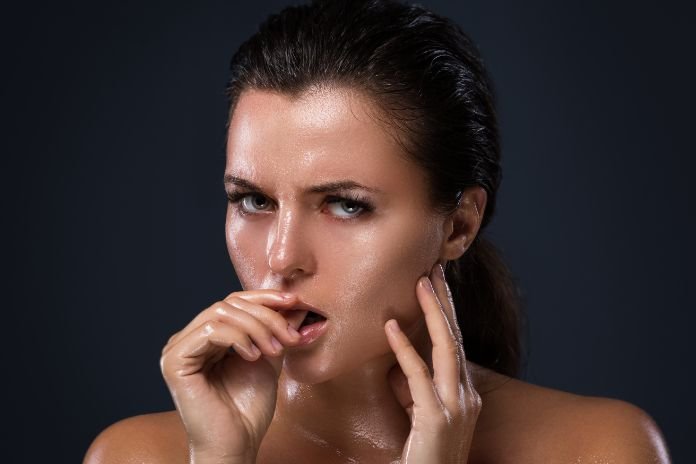Are you tired of waking up with an oily face every morning? Does your skin feel greasy, shiny, and congested, even after a good night’s sleep? If you’re struggling with oily skin, you’re not alone. It’s a common skin concern that affects many people, and it can be challenging to manage. In this article, we’ll explore the reasons why your face is oily when you wake up and give you practical tips on how to get rid of that oiliness for good.
Contents
Understanding Oily Skin
Before we dive into the causes and solutions for oily skin, let’s first understand what oily skin is. Oily skin is a result of overactive sebaceous glands that produce excess sebum, a waxy, oily substance that lubricates and protects the skin. Sebum is essential for maintaining healthy skin, but too much of it can cause problems like clogged pores, acne, and an oily complexion.
Causes of Oily Skin
Now that we know what oily skin is let’s explore the various factors that can lead to oily skin.
Hormonal Imbalance: Hormonal changes during puberty, pregnancy, and menopause can cause an increase in androgen levels in the body. Androgens are male hormones that are also present in females, and they can stimulate the sebaceous glands to produce more sebum, leading to oily skin. This is why many teenagers experience oily skin during puberty, and women may experience oily skin during pregnancy and menopause.
Genetics: Oily skin can be inherited from your parents, and it’s more prevalent in certain ethnic groups. People with oily skin tend to have larger sebaceous glands that produce more sebum than people with normal or dry skin. This means that if your parents have oily skin, you’re more likely to have oily skin as well.
Environmental Factors: Environmental factors like heat, humidity, and pollution can increase sebum production and make your skin oily. Heat and humidity can cause the sweat glands to produce more sweat, which can mix with sebum and create a greasy film on the skin. Pollution can also clog pores and stimulate sebum production, leading to oily skin.
Skincare Products: Using the wrong skincare products or applying them incorrectly can also lead to oily skin. Harsh cleansers, astringents, and toners can strip the skin of its natural oils, causing it to produce even more sebum to compensate. Similarly, using heavy, oil-based moisturizers or makeup can clog pores and lead to oily skin.
Diet: Eating a diet high in processed foods, sugar, and dairy products can trigger sebum production and make your skin oily. These foods can cause inflammation in the body, which can stimulate sebum production and lead to acne and oily skin. On the other hand, a diet rich in fruits, vegetables, and healthy fats like avocado and salmon can help reduce oiliness and improve overall skin health. Drinking plenty of water can also help flush out toxins and keep the skin hydrated, reducing oil production.
How to Get Rid of Oily Skin
Now that we’ve identified the causes of oily skin let’s explore some practical tips on how to manage and get rid of that oiliness.
Use a Gentle Cleanser: Washing your face twice a day with a gentle cleanser is an essential step in managing oily skin. Look for a cleanser that’s specifically formulated for oily skin and free from harsh ingredients that can strip your skin of its natural oils. Avoid using hot water when washing your face as it can be too harsh and cause the skin to produce more oil to compensate. Instead, use lukewarm or cool water to wash your face, which can help to soothe and calm the skin.
Exfoliate Regularly: Exfoliating is an effective way to remove dead skin cells and unclog pores, which can reduce oiliness and prevent breakouts. However, it’s important not to over-exfoliate, as this can cause irritation and more oil production. Limit your exfoliation to once or twice a week, depending on your skin’s needs, and choose a gentle exfoliating product that’s suitable for oily skin.
Use a Toner: Toners can help balance your skin’s pH levels, reduce oiliness, and prepare your skin for other skincare products. Look for a toner that contains salicylic acid, which can help unclog pores and reduce sebum production. Other ingredients to look for in a toner for oily skin include witch hazel, tea tree oil, and alpha-hydroxy acids.
Moisturize: Even if you have oily skin, you still need to moisturize to keep your skin hydrated. Look for a lightweight, oil-free moisturizer that won’t clog your pores. Moisturizing can actually help to reduce oiliness by preventing the skin from overproducing oil to compensate for dryness. Apply moisturizer after cleansing and toning to lock in moisture and keep your skin looking healthy and balanced.
Use Oil-Absorbing Products: Oil-absorbing products like blotting papers, powders, and primers can help reduce shine and oiliness throughout the day. Blotting papers can quickly absorb excess oil without disturbing your makeup, while powders and primers can help mattify the skin and keep it looking fresh and shine-free. Look for products that are specifically formulated for oily skin and won’t clog your pores or irritate your skin.
How to avoid oily face in the morning?
Waking up with an oily face can be frustrating and make you feel self-conscious throughout the day. Fortunately, there are steps you can take to reduce oiliness and wake up to a fresh, balanced complexion.
- Use a Mattifying Night Cream: Applying a mattifying night cream can help reduce excess oil production while you sleep. Look for a lightweight, oil-free formula that’s specifically formulated for oily skin. Mattifying night creams often contain ingredients like salicylic acid, niacinamide, and retinol that can help unclog pores, reduce inflammation, and control sebum production.
- Wash Your Face Before Bed: Cleansing your skin before bed is essential to remove dirt, oil, and makeup that can clog pores and lead to oiliness. Use a gentle cleanser that’s suitable for oily skin, and avoid using hot water as it can strip your skin of its natural oils. After cleansing, apply a toner to balance your skin’s pH levels and prevent excess oil production.
- Use an Oil-Absorbing Sheet: Using an oil-absorbing sheet in the morning can quickly remove excess oil from your skin without disrupting your makeup. Blotting papers, powder puffs, or oil-absorbing primers can all help reduce shine and keep your skin looking fresh and matte throughout the day.
- Apply a Lightweight Moisturizer: Even if you have oily skin, it’s important to moisturize to keep your skin hydrated and prevent it from producing more oil. Look for a lightweight, oil-free moisturizer that won’t clog your pores and apply it after cleansing and toning your skin. Moisturizers containing ingredients like hyaluronic acid, glycerin, and ceramides can help lock in moisture without making your skin feel greasy.
- Avoid Heavy Makeup: Wearing heavy makeup can exacerbate oiliness and clog pores, leading to breakouts and irritation. Opt for lightweight, oil-free makeup products that won’t clog your pores and allow your skin to breathe. Look for products that are specifically formulated for oily skin, such as matte foundations, powder blushes, and oil-free concealers.
By incorporating these steps into your skincare routine, you can help prevent oiliness and wake up to a fresh, balanced complexion. Remember to be patient and consistent in your skincare routine, as it can take time to see the full benefits of these changes.
FAQs:
Is it bad to have oily skin?
No, oily skin is not necessarily bad, but it can be challenging to manage and may lead to skin problems like acne and clogged pores.
Can oily skin be treated?
Yes, oily skin can be managed and treated with proper skincare, diet, and lifestyle changes.
Should I avoid using moisturizer if I have oily skin?
No, even if you have oily skin, you still need to moisturize to keep your skin hydrated. Look for a lightweight, oil-free moisturizer that won’t clog your pores.
Can my diet affect my skin’s oiliness?
Yes, eating a diet high in processed foods, sugar, and dairy products can trigger sebum production and make your skin oily. On the other hand, a diet rich in fruits, vegetables, and healthy fats like avocado and salmon can help reduce oiliness and improve overall skin health.
Can stress cause oily skin?
Yes, stress can trigger hormonal changes that can stimulate sebum production and make your skin oily. Practice stress-reducing activities like yoga, meditation, and deep breathing to help manage oily skin.
Conclusion
Oily skin can be frustrating and challenging to manage, but with the right skincare, diet, and lifestyle changes, it’s possible to get rid of that oiliness. Start by understanding the causes of oily skin and making small changes like using a gentle cleanser, exfoliating regularly, and using oil-absorbing products. Remember to moisturize, even if you have oily skin, and practice stress-reducing activities to manage oily skin from the inside out. With a little patience and perseverance, you can achieve a healthy, balanced complexion that’s free from excess oil.





